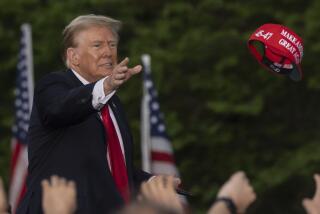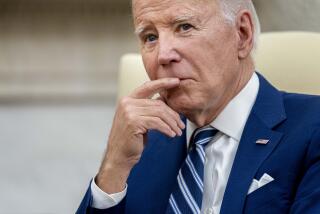Clinton’s Lack of Simple Message Seen As a Weakness
- Share via
YELM, Wash. — Stan Zal feels good enough about Bill Clinton that he drove 10 miles in a pelting rain Thursday to watch the president’s 13-bus entourage rumble through this town on a campaign tour from Seattle to Portland, Ore.
But don’t press too hard about which Clinton ideas he likes best.
“He’s doing the job about right,” said Zal, a cabinetmaker who says he has been pretty attentive to this year’s campaign. “But I guess I haven’t thought a lot about the specifics. I can’t remember a lot of them.”
If Clinton’s front-running campaign has a vulnerability with voters, this may be it: It is built on a broad array of mostly modest-sized issues, rather than a handful of simple, powerful ones.
Pollsters say Clinton’s diffuse agenda is part of the reason his support remains relatively weak among about half the voters who back him. And his Republican foes hope this will give them an opening to eat into the president’s lead in the six weeks that remain until the election.
Not that Clinton is showing many signs of feeling vulnerable. As his bus tour rode through the Northwest, Clinton--for the first time in this campaign--seemed to be willing to share his political capital with his party’s congressional candidates.
He invited several of the Democratic candidates in the state to join him. And as the bus stopped here, he interrupted his own speech--a rare move--to invite comments from Adam Smith, a congressional hopeful who this week outpolled Rep. Randy Tate, a Republican, in the state’s open primary.
“I was really impressed that our candidate for Congress . . . got more votes than the incumbent,” Clinton said.
In another sign of support for the party’s efforts to win back control of Congress, Clinton aides announced in Washington that they were dispatching a top fund-raiser, Terence McAuliffe, to fill coffers for congressional races.
McAuliffe will take a leave from his job as co-chair of the Clinton-Gore reelection committee. The Democratic National Committee, which has been the focus of some grumbling from congressional candidates for hoarding its funds for the presidential race, also announced that it had given an additional $2 million to be divided between the party’s Senate and House campaign efforts.
Still, there is the nagging question of whether Clinton’s large lead may also be a soft one.
The simple, direct message has always had a special appeal for voters. Ronald Reagan’s formula of less government, lower taxes and a stronger national defense offers one example.
But Clinton is calling for a more subtle shift in the national direction, a course change that he has tried to explain by laying out dozens of ideas--from tuition tax breaks to teen curfews. Carefully market-tested in polling and focus groups, these proposals bring favorable reactions from large numbers of voters.
Yet polls have consistently shown that Clinton’s proposals don’t have the staying power with many voters that a candidate seeks. The problem shows up when pollsters ask people to describe what issues have drawn them to a candidate. Clinton supporters list a wide variety of issues--from education to health care to support for the elderly--no one or two of which dominate.
“They’re all over the map,” said Karlyn Bowman, an opinion analyst and resident scholar at the American Enterprise Institute, a conservative think tank. “Nothing really big comes to mind very easily.”
Similarly, many voters have a tough time coming up with a top achievement of Clinton’s. Forty-four percent simply said they could not name an achievement when asked in a recent poll by the Pew Research Center for the People and the Press.
Clinton’s appeal has been built not so much on an affirmative support of his program, but rather on a rejection of what the GOP seems to have been offering.
“The approach is, ‘We’re kind of like the Republicans, but not that mean,’ ” said Andrew Kohut, director of the Pew center. “I think it’s just about that simple.”
This appeal has been sufficient to lift Clinton to a large lead over rival Bob Dole. Yet there remains a big slice of voters who do not have a commitment to his goals or do not understand them.
And such affirmative support is important not only for the election, but in the upcoming term, if Clinton does win.
Joe Lockhart, press secretary for the Clinton campaign, acknowledges that Clinton’s pitch may not be “quite as simple as Ronald Reagan’s.”
Reagan could offer a simple message because he was content not to delve too deeply into how to solve complicated public policy problems, Lockhart says.
In contrast, he argues, Clinton set out to “offer a plan that was as clear and specific as possible” to demonstrate a contrast to Dole’s plans that the Democrats maintain are purposely left hazy in their goals and financing.
But if the campaign’s goal is to be clear, the result for many voters is fuzziness.
Clinton seems to be a reasonable alternative to a Republican Party that had veered off in a dangerous direction, and seems to be “generally for the people,” said Ron Grieb, who works for the federal General Services Administration and also teaches economics.
But on specifics, nothing stands out. “I guess I can’t say there’s anything really big that I expect him to do, or not do,” he said.
More to Read
Get the L.A. Times Politics newsletter
Deeply reported insights into legislation, politics and policy from Sacramento, Washington and beyond. In your inbox twice per week.
You may occasionally receive promotional content from the Los Angeles Times.











